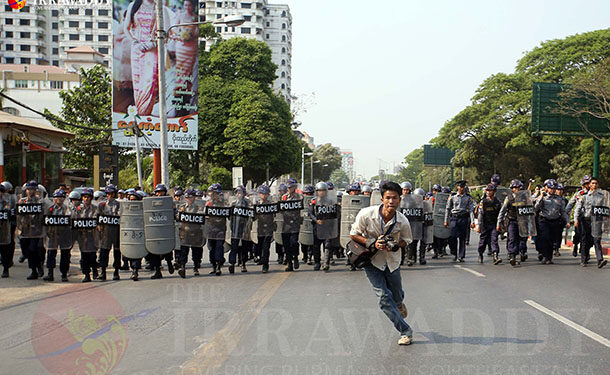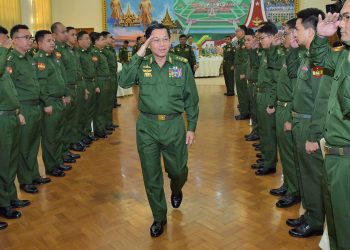RANGOON — Burma’s Upper House of Parliament has decided to review a bill to replace the controversial Peaceful Assembly and Procession Law, so as to align it more closely with international human rights standards, after criticism from rights groups that it retained several provisions used to stifle dissent in recent years.
First enacted in 2012 under the previous military-backed government, the law—which ostensibly bestowed new rights of protest and assembly—was repeatedly used to arrest and imprison activists who flouted its harsh provisions. This included the need to seek “permission” from local authorities five days in advance of the protest and to supply detailed information on the content and intended route of the activities.
Earlier this month, the ruling National League for Democracy (NLD) recommended in the Upper House of Parliament that significant changes be made to the Peaceful Assembly law. Demonstrators would only need to “notify” local authorities 48 hours in advance, a new statute of limitations of 15 days would be introduced, and protestors would not be vulnerable to prosecution from multiple township authorities.
However, the proposal to merely reduce, rather than abolish, prison sentences for violating sections of the law—and to continue to require detailed information on proposed protests be provided to local authorities—has drawn criticism from both local and international human rights groups. It also led to accusations that the amendment of the law was being rushed by the NLD.
Four lawmakers brought debate of the replacement bill to Thursday’s legislative session. In particular, they recommended that the requirement for protest leaders to supply the content of slogans to local police along with the names of speakers should be “deleted or amended.”
One lawmaker suggested further reducing the statute of limitations for filing lawsuits against protestors to seven days, but another recommended increasing the original proposal to 30 days.
Members of the Upper House Bill Committee on Friday discussed the new bill with representatives from the Thailand-based Assistance Association for Political Prisoners (Burma), or AAPP.
Bo Kyi, joint secretary of the AAPP, described the changes in the bill as insufficient in addressing challenges faced by activists in Burma, since peaceful protests could still entail jail terms, and impromptu demonstrations were not accounted for.
“[The law] has yet to [secure rights of] peaceful assembly and protest for anyone living legally in the country,” Bo Gyi told The Irrawaddy.
“If Burma wants to address its ugly record of human rights violations, it has to amend the law in accordance with international standards,” he said.
Zaw Min, who chairs the Upper House Bill Committee, told The Irrawaddy on Friday that the committee would look into amending the bill.
“The recommendations we received from different human rights associations and legal experts are quite similar,” Zaw Min said. “We will consider including their recommendations and redrafting the bill before submitting it to Parliament.”
Amnesty International’s South East Asia and Pacific Director Rafendi Djamin sent an open letter to Burma’s Parliament the previous week, urging a review of the bill through a transparent consultation with relevant stakeholders.
“Failure to do so not only risks more arrests, detention, prosecution and imprisonment of peaceful protesters, it also could undermine wider efforts to reform the country’s legal framework in general,” the letter stated.

















